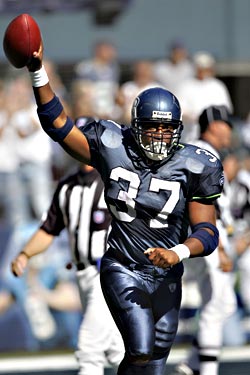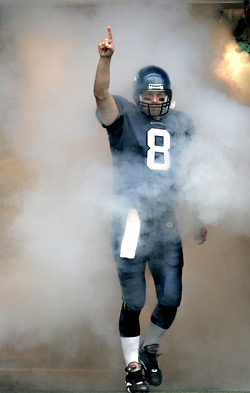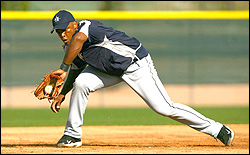After stumbling around like narcoleptics for much of April in a successful effort to avoid playing .500 baseball, the Seattle Mariners still somehow boast a few fans who believe the team will compete for a world championship next fall. This, alas, is the opinion of those who won’t be surprised if Bob Edwards is replaced on NPR by Howard Stern, and if Shroud of Turin scholars confirm that the mysterious face on the cloth is indeed that of Mel Gibson.
Strictly speaking, none of the above (the Gibson part, for example) is impossible. Let’s just suggest that the postseason prospects of the 2004 Seattle Mariners are proving to be every bit as improbable as, say, Antonin Scalia being asked to star in the screen bio of Danny DeVito (as Clarence Thomas’ ventriloquist, Scalia has shown himself to be a capable entertainer, but the condescending Supreme just isn’t tall enough to be a convincing DeVito).
Anyway, the perennial 90- plus game-winning M’s started at 1-7. Explanations and excuses abounded: The batters couldn’t start rallies, the bullpen couldn’t stop them, the dog ate their homework, etc. Few were willing to concede that a 1-7 start could be evidence of a 1-7 team. That would translate for the season to 23-139, mathematically eliminating the M’s by about May 12. Obviously this would never happen, though the Sunday, April 18, win still left the 4-8 club just missing tying its 1978, ’90, and ’98 copies for the worst dozen-game start in team annals. Monday night’s win left them at 5-8.
Through the first few weeks, the local murmuring increased to a din: When would the slow start turn around? Cheerleaders (play-by guy Rick “Rah-Rah” Rizzs, for one) thought it had as of the sixth inning in Anaheim on Thursday, April 15. By then the M’s offense had shown about as much potency as a celibate with headaches. Seattle had managed but a run based on a hit batter. The 2-1 Anaheim advantage going into the sixth looked insurmountable in light of other M’s “efforts.” The night before, for example, Seattle had go-ahead runners at second and third with none out in the ninth and couldn’t squeeze one home. But the sixth inning of April 15 would be different: five runs on five hits (and a little help from Angel lapses), and a 6-2 score that held. Suddenly Ryan Franklin (the No. 5 starter last season) looked like the ace of the pitching staff.
Yet at Safeco Field the next night, Seattle got spooked by another in a series of big second innings by opponents, losing to Texas, 5-0. This was a Rangers contingent with by far the American League’s best team batting average (the Yankees, speaking of improbables, have been the weakest AL hitters so far). The home club salvaged two from Texas, and locals finally got a glance at what frustrated field boss Bob Melvin calls his regular starting lineup. “Regular” means: including new acquisitions Raul Ibanez, Rich Aurilia, and—finally—Scott Spiezio. The latter, victimized for a few weeks by a freak back injury, was the key to Saturday’s 4-1 triumph, the high point of which was a fourth-inning rally in which the three new arrivals occupied the bases at the same time. Dan Wilson, suddenly hitting as well as he catches, slapped a double into a gap and it was 3-1. With Jamie Moyer pitching one of the best games of his career and Joel Pineiro bound to show up tough on Sunday, it seemed conceivable that .500 by May wasn’t just an idle wish. But a two-run Texas effort (in the second inning, of course) threatened to perpetuate the season’s pattern: The M’s get down early and lack what it takes to come back. It didn’t happen Sunday because Ibanez, Spiezio, and Bret Boone smacked long balls that secured the 4-2 triumph. Just as important: Closer Eddie Guardado seems comfortable again with his nickname. “Everyday Eddie” had back-to-back saves against Texas.
Winning consistently requires energy. Observers are running out of ways to say how old and slow these guys are (maybe we could get Gibson to translate it into that 2004 fad language Aramaic). When Cal Ripken Jr. showed up in the press box Sunday, some may have wondered whether he’d been signed to play shortstop (he was actually pushing an instructional manual, but he’d fit right in with the Seattle fogies). Age doesn’t mean the M’s are condemned to lose. They could be expected to miss the playoffs again by winning 80-some this season, but by then the pitching staff would have been demoralized by an offense that can’t match the opposition. After Friday’s 5-0 loss, Melvin marveled that his club could get eight hits without scoring a single run. Imagine how the pitchers feel.








